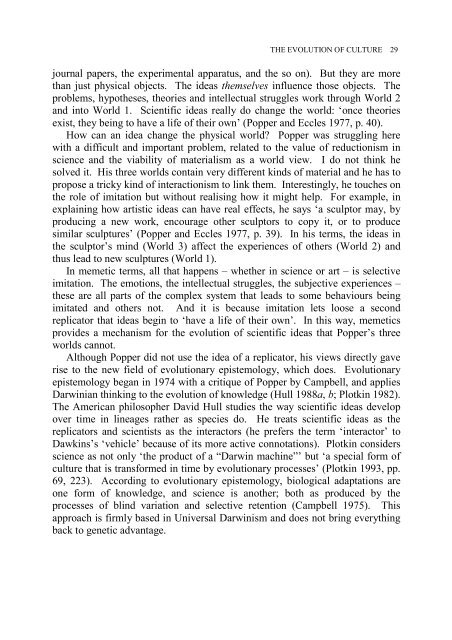The Meme Machine
TheMemeMachine1999
TheMemeMachine1999
- No tags were found...
You also want an ePaper? Increase the reach of your titles
YUMPU automatically turns print PDFs into web optimized ePapers that Google loves.
THE EVOLUTION OF CULTURE 29<br />
journal papers, the experimental apparatus, and the so on). But they are more<br />
than just physical objects. <strong>The</strong> ideas themselves influence those objects. <strong>The</strong><br />
problems, hypotheses, theories and intellectual struggles work through World 2<br />
and into World 1. Scientific ideas really do change the world: ‘once theories<br />
exist, they being to have a life of their own’ (Popper and Eccles 1977, p. 40).<br />
How can an idea change the physical world? Popper was struggling here<br />
with a difficult and important problem, related to the value of reductionism in<br />
science and the viability of materialism as a world view. I do not think he<br />
solved it. His three worlds contain very different kinds of material and he has to<br />
propose a tricky kind of interactionism to link them. Interestingly, he touches on<br />
the role of imitation but without realising how it might help. For example, in<br />
explaining how artistic ideas can have real effects, he says ‘a sculptor may, by<br />
producing a new work, encourage other sculptors to copy it, or to produce<br />
similar sculptures’ (Popper and Eccles 1977, p. 39). In his terms, the ideas in<br />
the sculptor’s mind (World 3) affect the experiences of others (World 2) and<br />
thus lead to new sculptures (World 1).<br />
In memetic terms, all that happens – whether in science or art – is selective<br />
imitation. <strong>The</strong> emotions, the intellectual struggles, the subjective experiences –<br />
these are all parts of the complex system that leads to some behaviours being<br />
imitated and others not. And it is because imitation lets loose a second<br />
replicator that ideas begin to ‘have a life of their own’. In this way, memetics<br />
provides a mechanism for the evolution of scientific ideas that Popper’s three<br />
worlds cannot.<br />
Although Popper did not use the idea of a replicator, his views directly gave<br />
rise to the new field of evolutionary epistemology, which does. Evolutionary<br />
epistemology began in 1974 with a critique of Popper by Campbell, and applies<br />
Darwinian thinking to the evolution of knowledge (Hull 1988a, b; Plotkin 1982).<br />
<strong>The</strong> American philosopher David Hull studies the way scientific ideas develop<br />
over time in lineages rather as species do. He treats scientific ideas as the<br />
replicators and scientists as the interactors (he prefers the term ‘interactor’ to<br />
Dawkins’s ‘vehicle’ because of its more active connotations). Plotkin considers<br />
science as not only ‘the product of a “Darwin machine”’ but ‘a special form of<br />
culture that is transformed in time by evolutionary processes’ (Plotkin 1993, pp.<br />
69, 223). According to evolutionary epistemology, biological adaptations are<br />
one form of knowledge, and science is another; both as produced by the<br />
processes of blind variation and selective retention (Campbell 1975). This<br />
approach is firmly based in Universal Darwinism and does not bring everything<br />
back to genetic advantage.



